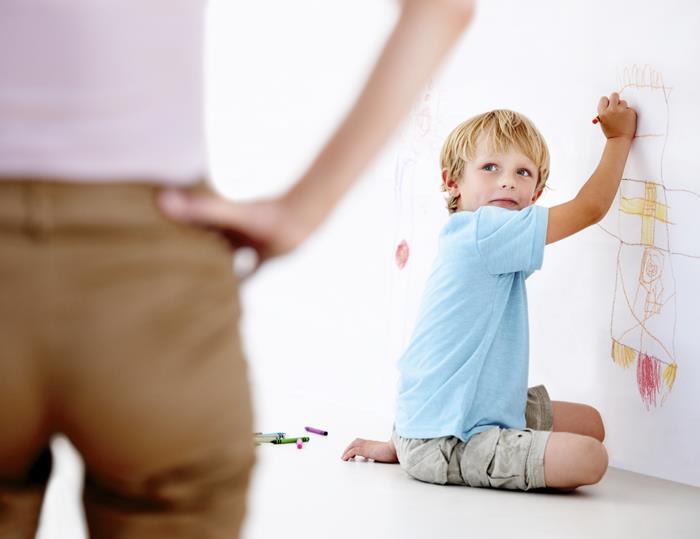Kids frustrating you? Before you (over)react, “CHECK” yourself!

As parents, we’ve all been there.
You told them: “Be careful, you’re gonna break it!”…aaaand it breaks.
You’ve said: “Hurry up or we’re gonna be late!”…aaaand they don’t hurry…aaaand you’re late.
You’ve yelled: “You’re going to hurt your brother!”…aaaand he gets hurt.
Patience: Gone.
Blood: Boiling.
Brain: RED!
It’s at this moment when you can change the trajectory of the relationship with your kids. As our kids are learning about the consequences of their actions, it’s difficult moments like these when they need our cool, calm support.
Yeah, sure! You’re frustrated and mildly, or majorly, furious! If they only listened to you in the first place! You’re boiling! Totally aggravated! Ticked off! Your brain is RED because you’re running hot and when you have a RED brain, reasoning often escapes with the steam coming out of your ears! Before you act, CHECK yourself. There are days where I literally say that out loud!
Something broke? CHECK yourself!
Running late? CHECK yourself!
Kids fighting? CHECK yourself!
CHECK yourself? Allow me to explain.
C: CALM DOWN. While reacting aggressively may seem like a quick fix, it’s not. In fact, it will most likely be completely counterproductive. Yelling, screaming, hitting, spanking, taking things away or other “traditional” reactions will not accomplish your long term goal of preventing the behavior from happening again. That’s what we want, right? We want our kids to have good problem-solving and risk management skills. We want them to think before they act, “make good choices” and be kind. Reacting aggressively will not accomplish that goal. What it WILL do is put your child in their red brain (fight or flight), increase their challenging behavior and create a power struggle. Now you have two red brains! One brain (yours) is an adult brain that’s frustrated and the other is a developing brain that needs help negotiating the difficulties of actually being a developing brain! That sound reasoning you wish your child would have? Yeah, those reasoning skills are still under construction. So, as the owner of the adult brain, you have to calm down first. How you do that is up to you: walk away, take a deep breath, go in the bathroom and think, get a drink of water, etc. You owe it to yourself, and your children, to get regulated…to CALM DOWN…before you engage.
H: HEAR what they are telling you. All behavior is communication. If a young child hits you, they may be telling you they’re frustrated in the only way their developing brain knows how to at the moment. If a child yells “SHUT UP” to you, they’re upset at something and don’t have the skills to express themselves in a way that is socially acceptable. Don’t take it personally- they’re having a hard time. Even though they just launched something offensive your way, they need you at that moment more than ever before. You have to look past the behavior. Reacting to the behavior is like trying to dry the bottom of your kitchen sink with a sponge…and the faucet is on. You may have temporary success, but until you go to the source of the problem, you’re not going to make big changes. The best way to get to the source of challenging behaviors? Listening! So, as we CHECK ourselves, we are CALM and we are HEARING what they’re really trying to tell us.
E: EMPATHIZE. Instead of yelling out “I TOLD YOU SO!” or “WHAT’S WRONG WITH YOU?” or “WHY DON’T YOU LISTEN WHEN I TALK TO YOU?”, it’s vital to remember that kids, and adults, learn from our mistakes. Those mistakes have natural consequences, and those natural consequences can be upsetting. Dr. Ross Greene, author of The Explosive Child, said it best: “Your child isn’t giving you a hard time, he’s having a hard time”. After a challenging behavior or aggravating event, beginning from a place of empathy will change the course of your interaction, and greatly improve the relationship with your child. If you start with empathy, you start with helping a child who clearly needs your help and support. If you start from a place of anger, you’re most likely going to end up in the cycle of yelling, screaming, hitting, spanking, taking things away, etc. and we’ve already talked about where that gets you- nowhere good in the long run. Empathy is the act of understanding, being aware of or being sensitive to the feelings, thoughts, and experience of another. As you CHECK yourself, you’ve stayed CALM, HEARD them, and EMPATHIZED. You understand what happened from their point of view, and you are ready to start solving problems so that they learn from the experience.
C: COLLABORATE. You’re the parent. You’ve already been a kid, so you have all the answers, right? Wrong! Whether you’re at a job, in a classroom, or at the kitchen table, any solution to a problem is more likely to be successful if the solution is mutually agreed upon by both parties. This C is not for the “candy store” you think you’ll give away. Collaborating is not being permissive- at all. When you collaborate, both concerns, the child’s AND the adult’s, are heard. Here’s an example. Your child is on their gaming system and dinner is ready. You asked them to come to the table. “One minute!”, he pronounces. Several minutes later, you tell him to come to dinner. “Hold on!”. Feel that blood pressure rising? Your initial reaction may be to walk over, turn off the TV, and yell “I said go to the table!” Here’s a more collaborative approach. You ask him to come to the dinner table. “In a minute!”. After the minute passes and nothing happens, you approach your child. “I noticed your having a hard time coming to the table…what’s going on?” Your kid tells you “I’m in the middle of a round”. You share your concerns because your concerns matter, too! “It’s important to me that we eat as a family and I don’t want the food to get cold, what can we do?”. Your child replies “I’ll be there when this round is over”. Sounds reasonable. Deal! Everyone wins. The following day, I would make an effort to make sure he doesn’t start any new rounds close to dinner time, using this collaborative moment as a reference. You just got your gamer to the dinner table. If you had turned off the TV mid-round, you most likely would’ve started a yelling match with a kid who might now refuse to come to dinner because he’s mad. Because we have two red brains, one giant power struggle and zero empathy, an offended parent may now take away the video games as a punishment, increasing the disconnection between you and your child. Train wreck. As a friendly reminder, the collaborative way got the child to the table. Stay CALM, HEAR what is being said (finishing the game is important to him), EMPATHSIZE, and COLLABORATE.
K: KINDNESS. As parents, we all strive to teach our kids to be kind, compassionate citizens and contributing members of society. It’s hard to be kind when you’re angry. You’re not being kind if you’re yelling, screaming, hitting, spanking, or taking things away. In order to teach kindness, we have to lead by example. If you want your child to respect you, you need to respect them. If you want your child to be kind, be kind to them. When moving at the speed of life, it’s tough to remember to be kind, but it’s essential. You can’t make a child behave better by making them feel worse. Remember, your child isn’t giving you a hard time, they’re having a hard time. Be kind.
So, the next time your child drives you bonkers, CHECK yourself!
C: CALM down.
H: HEAR what they are really telling you.
E: EMPATHIZE
C: COLLABORATE
K: KINDNESS
There’s nothing more powerful than a strong connection between a parent and child. It’s tough to be a kid…we’ve all been there. As we watch our kids’ brains develop and we agonize over the mistakes they make, keep yourself in CHECK. When you do, everyone benefits and we will build a generation of capable, and kind, children.
Greg Santucci, MS, OTR
Occupational Therapist
Executive Director
Power Play Pediatric Therapy
Tags: behavior, Challenging Behaviors, empathy, kindness, parenting
Categorised in: Uncategorized
